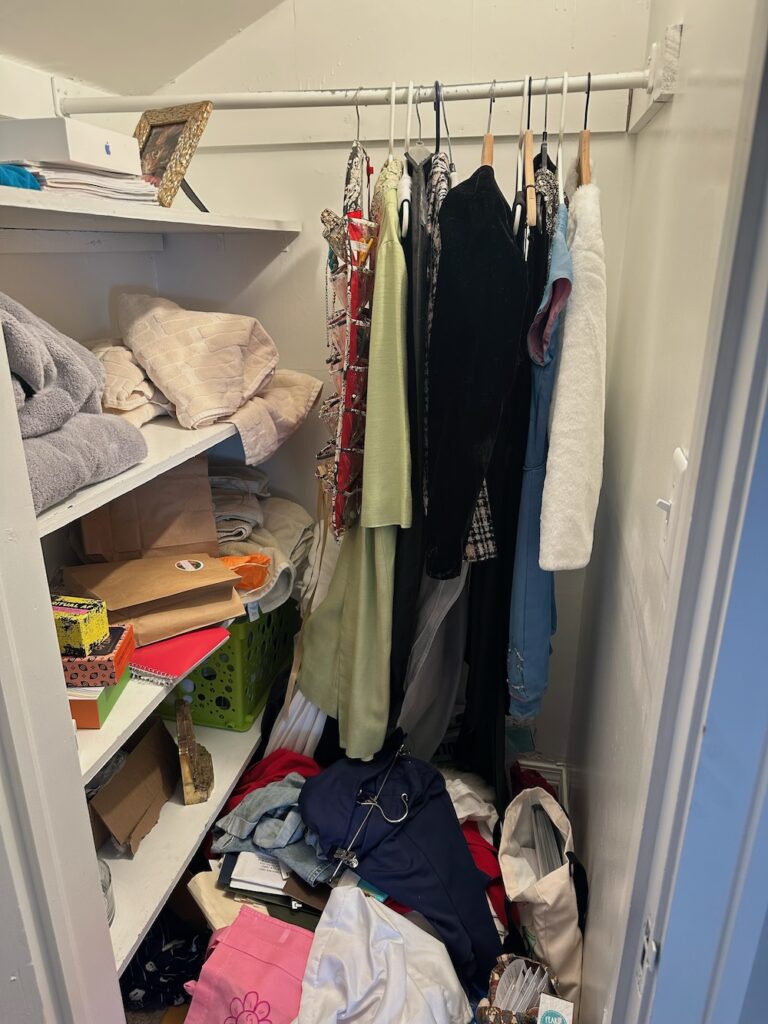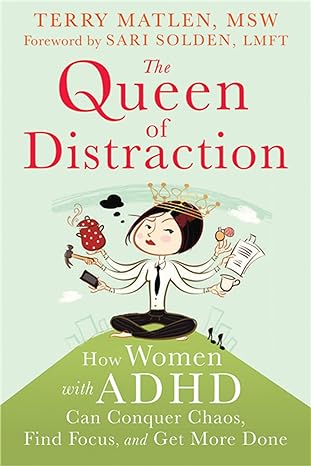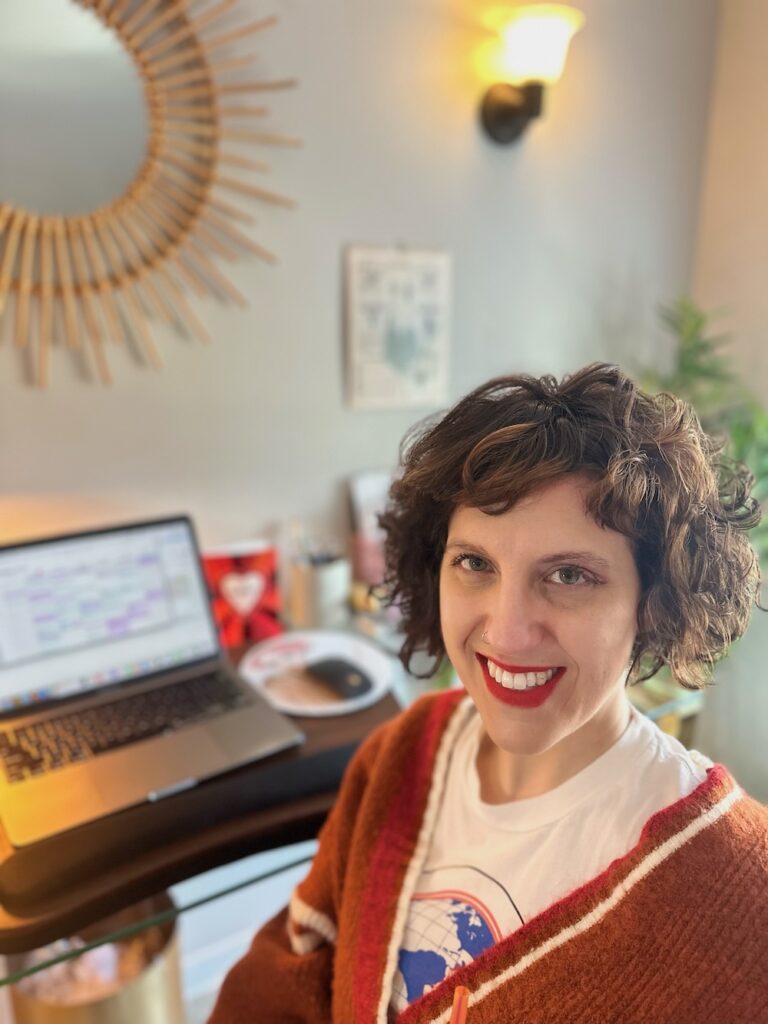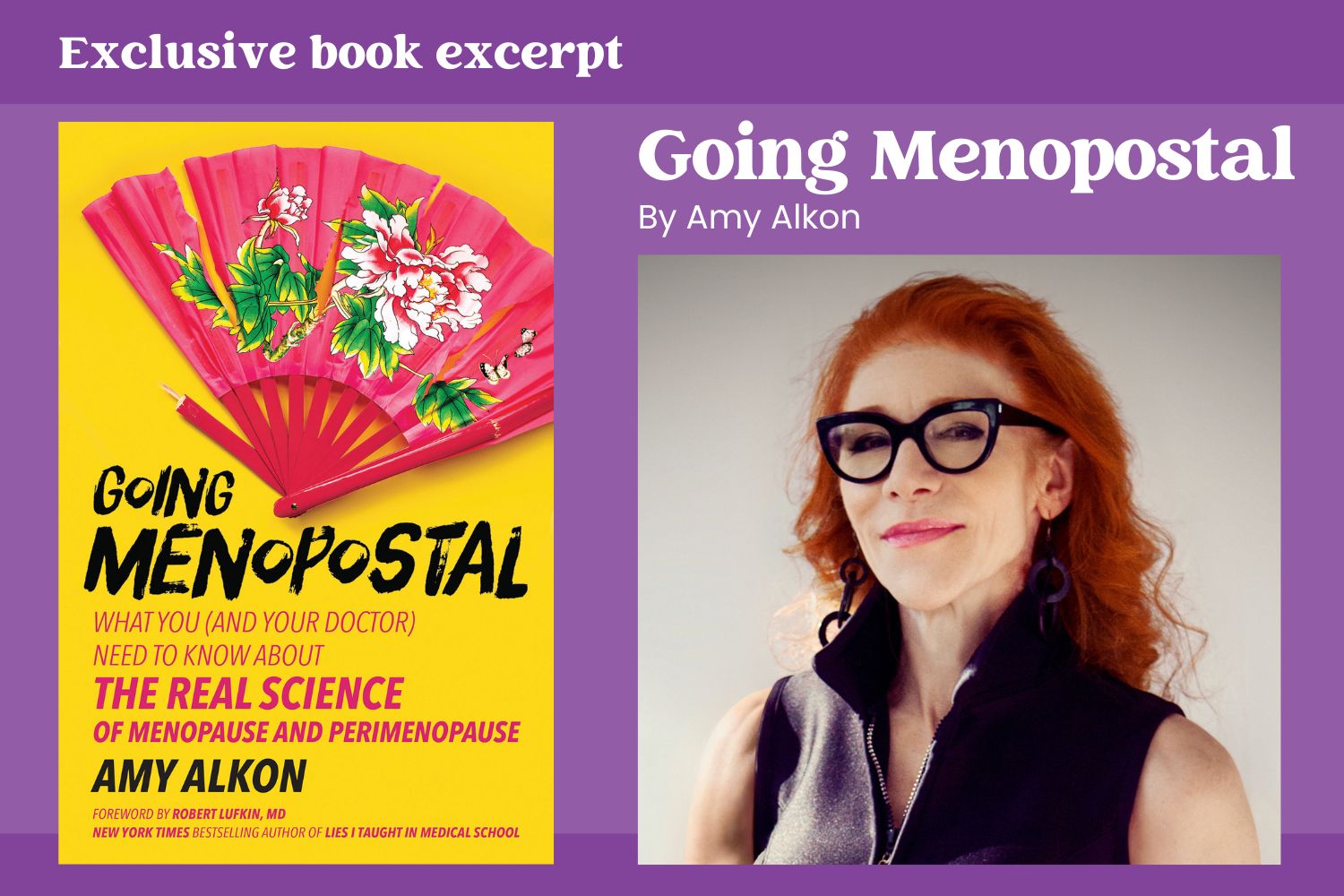
I was diagnosed with ADHD at 38—finally
I’ll never forget the time in grade school when my mother took me to a wallpaper store. While there, a woman brought her two children, who happened to be my classmates.
The mother — let’s call her Theresa — left the store without her children. She returned, of course, to retrieve them, exasperated and embarrassed by the blunder. My mom and I were taken aback. How could a mother do such a thing? How could your own offspring be an afterthought?
Now, 30 years later, I filter this encounter through a different lens: Did Theresa have Attention-Deficit/Hyperactivity Disorder (ADHD)? I’ll never know for sure, but I think it’s a very solid theory.
Spacey and scatterbrained? Or a seriously debilitating attention disorder?
As I navigate my own ADHD diagnosis, I wonder how many Theresas are out there: Women whom society views as flaky, lazy or spacy but in reality, they struggle with executive function and short attention spans.
Over my life, I’ve experienced plenty of stigma around ADHD that has left me feeling “less than.” For instance, I’m chronically late due to time blindness. I have baking horror stories. (Just ask my mom about the infamous chocolate chip cookies/bricks.) I routinely misplace important documents. I get overstimulated and overwhelmed in contexts when multiple people are peppering me with questions back to back. I leave the house without my keys each week more times than I’d like to admit. In other words, the struggle is real, despite modern interventions.
Recently, a college friend told me, “I don’t consider ADHD a mental health disorder.” Ouch. Despite attitudes like these, I am grateful that clinicians recognize it as a legitimate disorder and that help is available for the millions of us ADHD’ers in the United States.
Yet, despite the rapid pace of medical advancement, women with ADHD are still often left on the sidelines. Academics believe gender bias can lead to misdiagnosis and underdiagnosis of ADHD in women and girls. Boys receive ADHD diagnoses much more often than girls, according to the Centers for Disease Control and Prevention (CDC). The contrast is stark — 12.9% vs. 5.6% for women.

Getting answers, at last!
The path to diagnosis and treatment was not easy or straightforward, however. In the summer of 2022, at age 38, I’d had enough of the mainstream healthcare system. After my concerns were dismissed for far too long and the psych office waiting list remained insurmountable, I sought out a provider whose specialty is diagnosing and treating ADHD. I was referred to a specialized nurse practitioner by a friend and was optimistic he’d put me on the path to diagnosis and treatment.
Thankfully, I was right. At last, I felt seen and heard. Before my appointment, my husband and I completed several screening questionnaires that functioned as screening tools for depression and anxiety. We were to answer honestly about my behavior and habits and their frequency and severity. (Anxiety is a common bedfellow to ADHD.) I arrived at the appointment with the completed paperwork, anxious yet prepared for the next step.
Enter the Qb Test. It’s a 20-minute computer-based evaluation that measures the three core symptoms of ADHD: activity, attention, and impulsivity. Data from the test is compared to a normative control group of the same sex and age who do not have the disorder.
My provider and I reviewed the results together. Based on this screening tool and the surveys, we agreed I had the hallmark symptoms of an undiagnosed subtype of ADHD. Alas, my quirks, shortcomings, and mental blocks weren’t character flaws but textbook symptoms of ADHD! After receiving my diagnosis and working in partnership with the nurse practitioner and now a family doctor, I have access to consistent medication management.
I realize I’m among the few privileged Americans with the time, money and other resources to get to this point. But it wasn’t easy and I had to fight tooth and nail to feel seen and heard in a clinical setting. None of my family doctors in the past were willing or able to prescribe controlled substances, an often necessary aspect of treatment.
To make matters worse, all of the psychiatrist’s offices in my area were booked out for months at a time, due to COVID-related demand. That’s what led me to the nurse practitioner’s office. Taking a stimulant, coupled with some dietary changes and other coping mechanisms — like obsessive list-making — has helped me accomplish goals I might not have achieved otherwise.
This all begs some important questions: When it comes to getting a diagnosis, why do so many women with ADHD fall between the cracks compared to their male peers? What can be done to change the landscape? I decided to talk to two women who have ADHD—and a vested interest in bringing this discussion to the fore.
When I googled “ADHD and women,” and found Terry Matlen, I knew I had to speak with her. Diagnosed in her early 40s, Terry is a licensed master social worker (LMSW) who helps women navigate the challenges of an ADHD diagnosis and treatment — and thrive. She’s a psychotherapist, writer, consultant and ADHD coach, specializing in ADHD in adults. She also offers online group coaching for women with ADHD at QueensOfDistraction.com while maintaining several Facebook groups for women with ADHD.

Mind the (gender) gap: ADHD in girls vs. boys
I asked Matlen about the unique challenges that people who identify as women face when trying to be seen and heard in the modern healthcare system, and why their concerns are overlooked. She admitted that women are still underrepresented in clinical areas of mental health for several reasons.
“Starting off in childhood, girls tend to show their symptoms internally, not externally like boys,” Matlen said. “For instance, boys, generally, are acting out in school. They’re drawing attention to themselves and can’t control their behaviors. They’re pushing other kids in the lunchroom. They’re talking to kids in the back. All of this behavior brings them the type of attention that can lead to getting evaluated for ADHD.”
Girls, however, might be sitting in the back of the class twirling their hair, or be excessively chatty, Matlen notes. “They might have been called spacey, daydreamers or airheads, and they internalize these labels.”
Matlen has observed that often, especially if the girls are bright, as they grow older, they work to accommodate their symptoms, not knowing what they are. They figure out ways to remember things, and are socialized to not be as talkative.
“Generally, what I see as a clinician is when either they start a job or career, or they get married, [that’s when] they have to think of someone besides themselves and that becomes overwhelming,” Matlen says. “Another biggie is when the kids come — you’re not only thinking about your own needs, but also those of your partner and children. It becomes so overwhelming, and it builds up and this is when a woman often gets depressed.”
ADHD: Not just for kids
Matlen notes that it doesn’t help that nowadays women are expected to do and be more at home and work than the generation before. In these cases, she says, doctors might suggest an antidepressant, and the women themselves might not understand what’s going on.
“As a woman, we have the lovely experience of hormones fluctuating throughout our lives and on a monthly basis,” she says. “Starting with adolescence, we sometimes see ADHD symptoms either manifest or become exacerbated.”

Then as women go into the natural phases of perimenopause and menopause, estrogen levels drop. And that’s when the symptoms of ADHD in women — not always but frequently — get worse. (Estrogen works to help our brains focus, maintain attentiveness, and generally remember things.)
Treatment, often in the form of stimulants, can help women function, but left untreated, symptoms can get worse. However, Matlen says that medication use doesn’t represent the whole picture.
“There are other parts to it,” she says. “A lot of women figure out other ways to make their lives easier. For instance, it might mean working with an ADHD coach or a professional organizer. Going to ADHD conferences can help because there are hundreds and hundreds of people who are just like you.”
ADHD in women: From chaos to focus
When I spoke with Lindsey Guentzel via Zoom, she had just returned from the Annual International Conference on ADHD 2023. Lindsay is a television and radio host, producer, writer and mental health advocate who started a new chapter in life after being diagnosed with ADHD in January 2021. She is also the executive producer and host of Refocused, A Podcast All About ADHD, a project fueled by her passion for fostering connection through storytelling and her neverending curiosity to learn as much about ADHD as she can.
As another Millennial woman with ADHD, also diagnosed in her 30s, I was anxious to hear her perspective. Guentzel likens her pre-diagnosis experience to that of the ’90s blockbuster Independence Day.
“In the movie, these city destroyers attack New York and LA,” she says. “ It doesn’t matter what anyone does. When they throw out these chips, nothing works. It bounces right off their shields, their protective layer.”
Nothing changes until Jeff Goldblum and Will Smith go up into the mothership. They become infected with the virus and the shields come down. All of the military power and weapons are used on the city destroyers. Similarly, Guentzel says that pre-diagnosis, her struggles with ADHD were just as precarious.
“I look at everything in my life up until my diagnosis as city destroyers, “she says. “They are my anxiety, depression, rejection sensitivity dysphoria, my rumination, my feeling of self-worth and my friendships — everything that was all tied in and being controlled by this mothership as a woman.”
Still, the journalist and advocate has found ways to cope and even thrive, through approaches like therapy and mindfulness. Sharing experiences with other ADHD’ers has helped broaden her knowledge base and feel seen and heard.
ADHD tips from the trenches
Now, she’s eager to share what’s worked for her in terms of enhancing quality of life. Therapy, exercise, sleep, and eating well all make a meaningful difference. When it comes to diet, she references studies that show the connection between nutrition and cognition.
“I went gluten-free long before my ADHD diagnosis,” she says. “That actually cleared up a lot of brain fog for me. It’s something to definitely keep in mind because of the brain and gut health link. Be very aware of what you’re eating and how it makes you feel.”
A key aspect of her journey has been an emotional one. That means being open with those around her about how they can best support her. Rejection sensitivity dysphoria can rear its ugly head. During these moments Guentzel finds a strength in being vulnerable with others.
“That might mean that now I’ll say to someone, “Hey, when this happens, it makes me feel a certain way and I’m working on not letting those feelings take over,” she says. “But I just want you to be aware of that.”
Practically speaking, Guentzel says it’s important to be honest with yourself and set yourself up for success. A day planner helps her stay on track, but that’s just one approach among many. In her words, “It comes down to figuring out what works for you. And that sense of accountability has been really big.”
While Guentzel has hacked her ADHD, she’s concerned about the next generation of young women who aren’t yet diagnosed. In her estimation, there’s a massive influx of women who go from being incredibly successful in high school to struggling — being able to barely keep their heads above water in college. She attributes this to a simultaneous loss of structure and sudden independence.
Guentzel points out a factor that might not be as obvious to some parents. There can be a genetic connection. In other words, someone who thinks that they have ADHD might produce kids who have ADHD.
In this case, there’s no substitute for checking in.
“Have those conversations about that transition period: What is going to be lost and what is going to be expected of someone,” she says. “That can help young adults figure out their path. And it should be anyone going into college — men, women, nonbinary — however you identify. We have this expectation that at age 18, someone is supposed to have it all figured out, but that’s not the reality. “
Practically speaking, Guentzel says parents can put their college-bound daughters on the right track by working with them on essentials like:
- Figuring out a laundry schedule
- Optimizing your class schedule based on your body clock
- Discussing strategies for taking notes and managing workload

ADHD as a superpower
Because Matlen and Guentzel are such authentic voices from the trenches and they live this reality day in and day out, their insights and advice resonated with me. A lot of their strategies may sound like common sense, but for me, they validate my lived experience. In hindsight, I see my mishaps and quirks for what they are. I no longer consider myself a failure or a bad person. My brain just works differently. And that can be a beautiful thing.
In a world that values conformity, being (and thinking) different can feel like an act of rebellion. I’ll be 40 in June and I feel like I’ve arrived in so many ways. In fact, I think I’ll add “rebel” to my resume.



